-
PurposepsiCHECK2 dual luciferase reporter harboring a mutated let-7 target element, cloned into the XhoI/NotI restriction sites, the 3'UTR of the Renilla Luciferase gene
-
Depositing Lab
-
Sequence Information
Ordering
| Item | Catalog # | Description | Quantity | Price (USD) | |
|---|---|---|---|---|---|
| Plasmid | 78261 | Standard format: Plasmid sent in bacteria as agar stab | 1 | $89 | |
Backbone
-
Vector backbonepsiCHECK-2
-
Backbone manufacturerPromega
- Backbone size w/o insert (bp) 6273
- Total vector size (bp) 6302
-
Vector typeMammalian Expression, Luciferase ; microRNA activity
Growth in Bacteria
-
Bacterial Resistance(s)Ampicillin, 100 μg/mL
-
Growth Temperature37°C
-
Growth Strain(s)DH5alpha
-
Copy numberHigh Copy
Gene/Insert
-
Gene/Insert namemutated let-7 target site
-
SpeciesSynthetic
-
Insert Size (bp)29
-
Mutationnucleotides 2-5 and 10-11 changed from CTCC to GAGG and TC to AG, respectively
Cloning Information
- Cloning method Restriction Enzyme
- 5′ cloning site XhoI (not destroyed)
- 3′ cloning site NotI (not destroyed)
- 5′ sequencing primer CGTGCTGAAGAACGAGCAGT
- 3′ sequencing primer CAAACCCCCGCCTCCACGG
- (Common Sequencing Primers)
Resource Information
-
Article Citing this Plasmid
Terms and Licenses
-
Academic/Nonprofit Terms
-
Industry Terms
- Not Available to Industry
Trademarks:
- Zeocin® is an InvivoGen trademark.
These plasmids were created by your colleagues. Please acknowledge the Principal Investigator, cite the article in which the plasmids were described, and include Addgene in the Materials and Methods of your future publications.
-
For your Materials & Methods section:
psiCHECK2-let-7 MT was a gift from Joanne Weidhaas (Addgene plasmid # 78261 ; http://n2t.net/addgene:78261 ; RRID:Addgene_78261) -
For your References section:
miR-34 activity is modulated through 5'-end phosphorylation in response to DNA damage. Salzman DW, Nakamura K, Nallur S, Dookwah MT, Metheetrairut C, Slack FJ, Weidhaas JB. Nat Commun. 2016 Mar 21;7:10954. doi: 10.1038/ncomms10954. 10.1038/ncomms10954 PubMed 26996824



